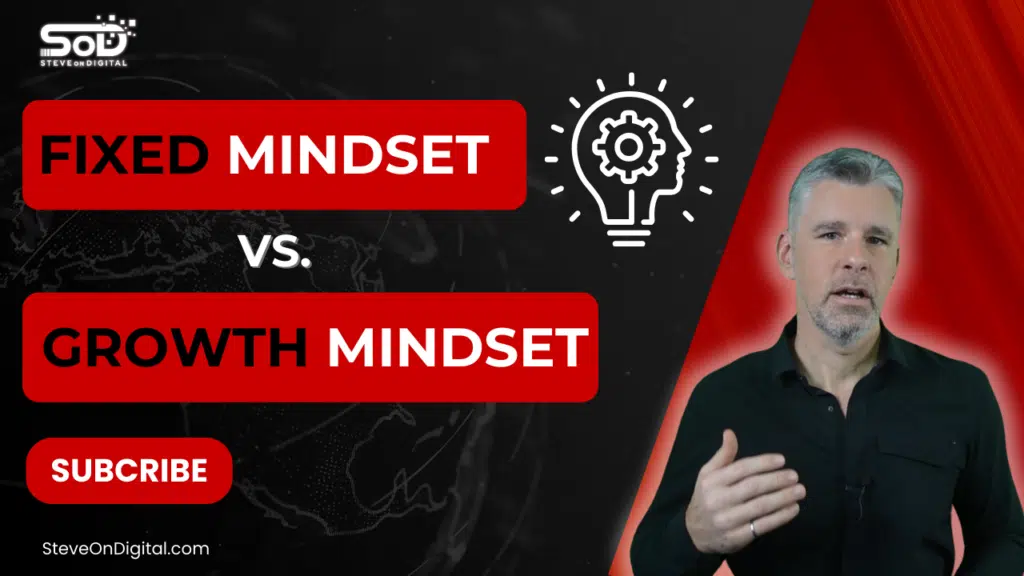Growth Mindset in Business: Drive Innovation And Collaboration

A growth mindset in business means believing that abilities and intelligence can improve through effort and learning. This approach fosters innovation, adaptability, and long-term success by encouraging continuous learning and improvement. Carol Dweck’s decades of research on growth mindset have shown how this approach can significantly influence organizational culture, leading to innovation and collaboration in the workplace. I’ve seen firsthand how adopting a growth mindset can transform a business. By focusing on challenges as opportunities, fostering team development, and promoting a culture of continuous improvement, businesses can stay competitive in a rapidly changing market. Let’s explore how this powerful mindset can drive success and innovation in your organization. I’m Steve, a digital transformation expert with a strong background in electrical engineering, an MBA, and a master’s in Project Management. I excel at helping SMEs navigate the digital landscape with practical insights. Let’s begin! Understanding Growth Mindset in Business A growth mindset in business is essential for fostering innovation, adaptability, and long-term success. By focusing on continuous learning and improvement, businesses can navigate challenges more effectively and stay competitive in a rapidly changing market. Definition and Origin of Growth Mindset The concept of a growth mindset originates from the work of Stanford University psychology professor Carol Dweck. She defined it as the belief that abilities and intelligence can be developed through dedication and hard work. This contrasts with a fixed mindset, where individuals believe their talents are innate and unchangeable. Growth Mindset vs. Fixed Mindset A growth mindset believes that intelligence and skills can improve with effort and persistence. In contrast, a fixed mindset believes that abilities and intelligence are static and unchangeable, which may hinder an individual’s potential. This fundamental difference impacts how individuals approach challenges and learning opportunities. Those with a growth mindset are more likely to embrace new challenges and view failures as opportunities to grow, whereas those with a fixed mindset may avoid challenges for fear of failure. Aspect Growth Mindset Fixed Mindset Belief Abilities can be developed Abilities are static and unchangeable View on Challenges Embraces challenges as opportunities to grow Avoids challenges due to fear of failure Response to Failure Sees failure as a learning opportunity Sees failure as a limit to abilities Effort Believes effort is essential for mastery Believes effort is fruitless if one lacks talent Learning Continuous learning and improvement are valued Avoids new learning opportunities The Role of Growth Mindset in Business Success Adopting a growth mindset can lead to significant long-term benefits for businesses. A growth mindset views intelligence, abilities, and talents as qualities that can be developed through effort and persistence. Companies that encourage a growth mindset often see increased innovation, better team development, and improved employee performance. By fostering an environment where continuous learning and improvement are valued, businesses can better adapt to changes and overcome obstacles. Key Characteristics of Growth Mindset Several traits define a growth mindset, making it a critical aspect of business success. Characteristic Description Embracing Challenges Views challenges as opportunities for growth and learning Effort and Persistence Recognizes that hard work and dedication are essential for success Learning from Mistakes Understands that mistakes are valuable learning opportunities Continuous Improvement Focuses on ongoing development and betterment Open to Feedback Welcomes feedback and uses it to improve Embracing Challenges A growth mindset views challenges as opportunities for growth and learning. In business, this means taking on new projects and exploring uncharted territories without fear of failure. By embracing challenges, businesses can innovate and stay ahead of the competition. Effort and Persistence Effort and persistence are crucial in overcoming obstacles and achieving success. A growth mindset acknowledges that hard work and dedication are essential components of progress. This approach helps businesses push through tough times and continue to grow. Learning from Mistakes Mistakes are valuable learning opportunities. A growth mindset encourages individuals to analyze their failures, understand what went wrong, and apply those lessons to future endeavors. This attitude helps businesses improve and avoid repeating past errors. Implementing Growth Mindset in Organizations Fostering a growth mindset within an organization requires practical steps and strategies. Leadership and Growth Mindset Leadership plays a pivotal role in promoting and sustaining a growth mindset culture. Leaders must model growth mindset behaviors, such as embracing challenges and learning from failures. By doing so, they set a positive example for the rest of the organization. Developing a Growth-Oriented Company Culture Creating a growth-oriented company culture involves promoting continuous improvement and innovation. This can be achieved by encouraging employees to take risks, experiment with new ideas, and share their insights and experiences. Training and Development Programs Implementing training programs helps employees develop new skills and perspectives. Training programs can help employees gain new perspectives by engaging in networking, sharing knowledge, and problem-solving with others. Providing opportunities for learning and growth ensures that employees stay engaged and motivated. These programs can include workshops, seminars, and online courses focused on developing a growth mindset. Benefits of Growth Mindset in Business Adopting a growth mindset in business brings a multitude of advantages. From fostering innovation to improving employee satisfaction, the benefits are extensive and impactful. Increased Innovation and Creativity A growth mindset fosters a culture of innovation and creativity by encouraging employees to think outside the box. This mindset drives individuals to explore new ideas and perspectives, leading to groundbreaking solutions and advancements. For instance, a company that values innovation can adapt quickly to market changes and stay ahead of competitors. According to a study by PwC, 60% of CEOs believe that creativity is the most important leadership quality for success in business. Enhanced Team Development Embracing a growth mindset positively impacts team development by promoting collaboration and continuous learning. A collaborative work environment, supported by leadership, encourages trust, innovation, and effective communication among employees. Teams with a growth mindset are more likely to embrace challenges together, leveraging each other’s strengths to achieve common goals. This collective effort leads to improved team dynamics and higher overall performance. From my experience, fostering a growth mindset

